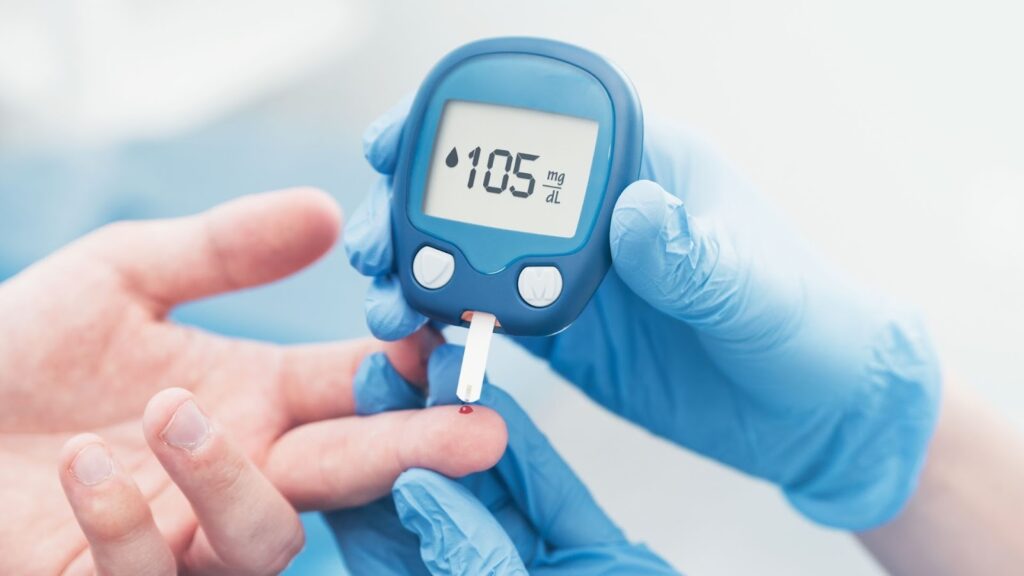Are High Glucose Levels and Anemia Related to Kidney Disease?
12/16/2025
Did you know that diabetes is the leading cause of chronic kidney disease (CKD) and that anemia is a common complication of chronic kidney disease? According to the National Kidney Foundation (NKF), 1 in 3 adults with diabetes also has kidney disease.
At the same time, patients with chronic kidney disease experience reduced production of red blood cells, leading to anemia in CKD, a condition that causes extreme fatigue and worsens kidney function over time.
If you’re feeling tired, noticing unusual blood sugar spikes, or dealing with anemia, it’s crucial to understand how these issues are connected. Early detection and proper diabetes care can prevent kidney failure and improve your overall health.
The Vital Connection: Kidneys, Blood Sugar, and Red Blood Cells
Your kidneys perform several essential functions, including:
- Filtering waste from the bloodstream and removing toxins through urine.
- Regulating blood pressure by balancing fluids and electrolytes.
- Producing erythropoietin (EPO), a hormone that stimulates red blood cell production in the bone marrow.

When blood sugar levels remain high (due to type 1 or type 2 diabetes), it damages the small blood vessels in the kidneys, contributing to diabetic kidney disease. This condition, called diabetic nephropathy, leads to kidney damage and reduces the kidneys’ ability to produce EPO (NIDDK).
Without enough EPO, your body doesn’t make sufficient red blood cells, leading to anemia in patients with diabetes, which worsens kidney health over time.
How High Blood Sugar Damages the Kidneys
The Impact of Diabetes on Kidney Health
Diabetes is the #1 cause of chronic kidney disease and kidney failure in the U.S. (CDC). When blood glucose remains high for extended periods, it causes:
- Damage to kidney blood vessels, reducing their ability to filter waste.
- Protein leakage in urine (proteinuria), which is a warning sign of early kidney disease.
- Fluid retention, leading to high blood pressure and swelling in the legs and feet.
Over time, poorly controlled diabetes forces the kidneys to work harder, leading to progressive damage and, eventually, end-stage renal disease (ESRD). The National Kidney Foundation (NKF) reports that diabetes accounts for 50% of all kidney failure cases in the U.S.
Anemia and Kidney Disease: A Dangerous Combination
Anemia in chronic kidney disease affects nearly 50% of CKD patients, especially in advanced stages (NIDDK). When the kidneys fail to produce enough erythropoietin (EPO), the bone marrow slows down red blood cell production.

This leads to:
- Chronic fatigue and weakness.
- Shortness of breath, even during mild activities.
- Dizziness and headaches due to reduced oxygen supply to the brain.
- Pale skin and cold hands/feet due to poor circulation.
Anemia in patients with type 2 diabetes and CKD can also increase the risk of heart disease, making diabetes care even more difficult.
The Dangerous Trio: High Blood Sugar, Anemia, and CKD
- High blood sugar damages kidney blood vessels, reducing their ability to function properly. Over time, this leads to chronic kidney disease (CKD).
- Weakened kidneys fail to produce enough erythropoietin (EPO), a hormone needed to make red blood cells, leading to anemia.
- Anemia results in lower oxygen levels in the body, worsening kidney disease in patients with diabetes.
- Declining kidney function makes it harder to regulate blood glucose, causing diabetes to progress more rapidly.
- As diabetes worsens, kidney damage accelerates, leading to end-stage kidney disease (ESKD) and an increased risk of requiring dialysis or a kidney transplant.
Who’s at Risk?
Certain individuals face a higher risk of kidney disease and anemia due to diabetes:
- People with Type 1 or Type 2 diabetes for more than 10 years, as prolonged high blood sugar levels accelerate kidney damage.
- Patients with high blood pressure, which worsens CKD and anemia.
- Those with a family history of kidney disease or diabetes, as genetic factors increase susceptibility.
- Individuals with obesity, since excess weight contributes to insulin resistance and high blood pressure.
- Older adults, as kidney function naturally declines with age.
Early detection through routine complete blood count (CBC) tests and kidney function tests can help slow the loss of kidney function.
Prevention and Treatment Options
How to Protect Kidney Function and Manage Anemia
1. Control Blood Sugar Levels
- Monitor blood glucose levels daily.
- Follow a low-carb, kidney-friendly diet.
- Take diabetes medications and insulin as prescribed.
2. Manage Anemia in CKD
- Eat iron-rich foods like leafy greens and lean meats.
- Take iron supplements to treat iron deficiency anemia.
- Consider erythropoietin (EPO) therapy under medical supervision.
3. Protect Kidney Function
- Stay hydrated and reduce salt intake.
- Avoid NSAIDs (like ibuprofen) that can harm the kidneys.
- Keep blood pressure under control with medication if necessary.
4. Advanced CKD Treatment
If kidney disease progresses, options include:
- Hemodialysis: Filters waste from the blood when kidneys fail. Learn more about home dialysis options here.
- Peritoneal dialysis: A more flexible home-based dialysis option.
- Blood transfusions: Used for severe anemia cases.
- Kidney transplant: The only permanent solution for kidney failure.
Take Action Before It’s Too Late
Ignoring high blood sugar levels, anemia, and CKD symptoms can lead to kidney failure, requiring dialysis or a kidney transplant.
- Monitor your blood sugar, kidney function, and anemia levels.
- Get regular checkups to catch CKD early.
- Follow a healthy lifestyle to slow disease progression.
By taking control of your health today, you can prevent complications and improve your quality of life.
Frequently Asked Questions
Kidney disease can affect how your body uses insulin, making blood sugar harder to control, especially in advanced stages or in people with diabetes.
Diabetes can lead to kidney damage, reducing erythropoietin production, which decreases red blood cell count and causes anemia over time.
Anemia commonly begins in stage 3 CKD and worsens in later stages due to reduced erythropoietin and iron deficiency.
Progression from stage 4 to stage 5 may take months to years, depending on health, blood pressure, diabetes control, and treatment adherence.
Early signs include fatigue, swelling in the ankles or face, and frequent or foamy urination, especially at night.
Information contained in this blog is for informational or educational purposes only and does not substitute professional medical advice or consultations with healthcare professionals. The content is not intended to be comprehensive or exhaustive, and it does not apply to any specific individual’s medical condition. Always refer to the personalized information given to you by your doctor, or contact us directly.

Dr. Allen Kaufman is the Chief Medical Officer and Senior VP for Clinical & Scientific Affairs at Dialyze Direct, with over four decades of experience in Nephrology. He began his career in 1980 and has held leadership roles including Chief of Nephrology & Hypertension at Beth Israel Medical Center (1998–2004), Chief of Dialysis at the Bronx VA Medical Center (1982–1990), and Chief of the Yorkville Dialysis Unit at Beth Israel and the Renal Research Institute (1990–2000). Dr. Kaufman has authored over 100 scientific publications and served as Principal or Co-Investigator on numerous NIH-funded research studies. A Fellow of the American College of Physicians, he is board-certified in Nephrology and Internal Medicine. He earned his medical degree from the University of Rochester and completed training at the Hospital of the University of Pennsylvania and Mount Sinai in New York. Dr. Kaufman is widely recognized with multiple “Best Doctor” and “Patients’ Choice” awards.